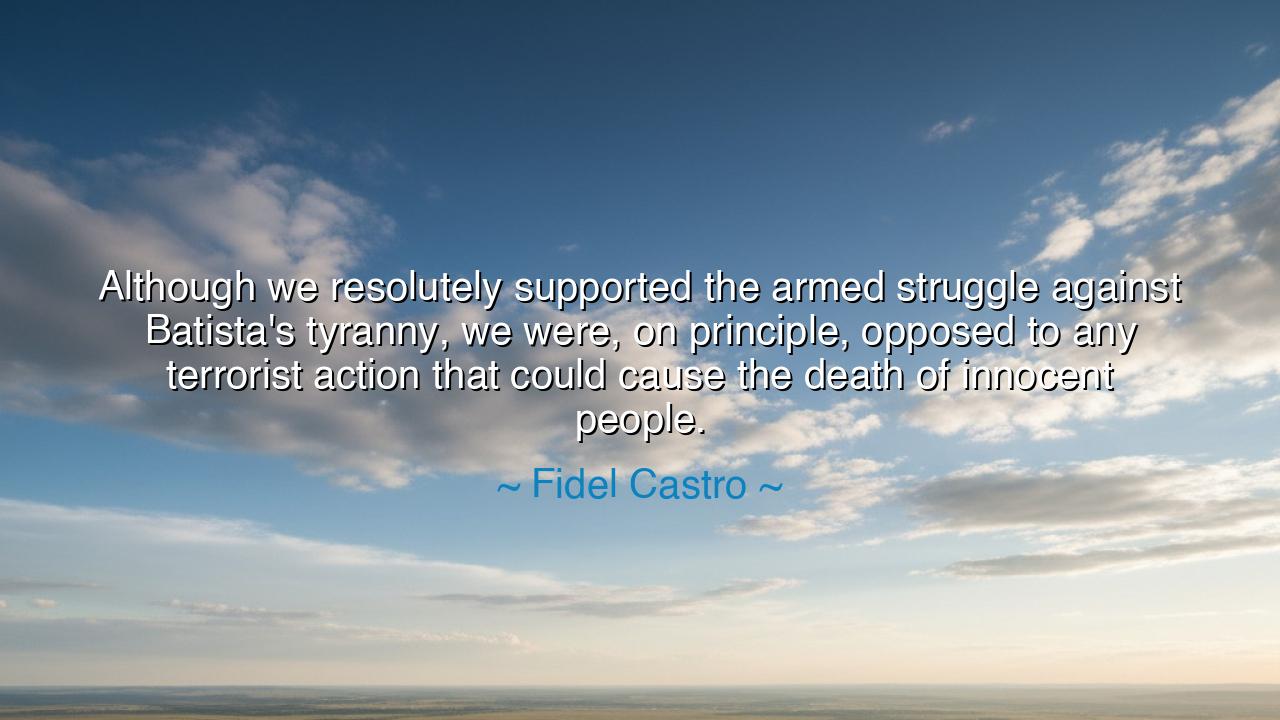
Although we resolutely supported the armed struggle against
Although we resolutely supported the armed struggle against Batista's tyranny, we were, on principle, opposed to any terrorist action that could cause the death of innocent people.






“Although we resolutely supported the armed struggle against Batista’s tyranny, we were, on principle, opposed to any terrorist action that could cause the death of innocent people.” Thus spoke Fidel Castro, the revolutionary whose name became both a symbol of defiance and a subject of endless debate. In this declaration, made during the early years of Cuba’s revolution, lies a truth that echoes across the ages: that even in the fires of rebellion, principle must stand guard over power. For when violence forgets its purpose, it devours not only tyrants but also the very ideals it sought to defend. Castro’s words, though born in a time of blood and upheaval, rise above the battlefield as a moral warning—that the sword, once drawn, must still obey the conscience of justice.
In the ancient world, the greatest warriors understood this balance. Aristotle spoke of courage as the golden mean between cowardice and recklessness; Sun Tzu taught that true victory lies not in destruction, but in mastery of restraint. Castro, though a man of revolution, understood the same principle. His armed struggle against the dictator Fulgencio Batista was not born from lust for violence, but from a belief that oppression could not be ended by submission alone. Yet he knew, as all who seek justice must, that the cause of liberty loses its sanctity the moment it turns against the innocent. Thus he proclaimed: fight, but do not destroy indiscriminately; resist, but remain human.
To grasp the power of this statement, one must remember the world into which it was spoken. Cuba in the 1950s groaned under the weight of corruption and cruelty. Batista’s regime ruled through fear, torture, and blood. The common people were silenced, their hopes buried beneath the boots of soldiers. In such times, anger burns hot and mercy grows cold. Many revolutions before had fallen into the same trap—transforming from noble resistance into blind vengeance. But Castro, despite the fervor of his struggle, sought to distinguish his revolution from terror. He insisted that freedom must never wear the mask of brutality, that the righteousness of a cause is proven not in its victory, but in the means by which it is won.
This lesson, though rooted in Cuba’s revolution, is as old as humanity itself. When Spartacus, the slave who rose against Rome, led his followers through the Italian hills, he too faced this same choice—to fight as beasts or as men. Though pressed by desperation, he forbade the killing of non-combatants, seeking to wage a war of liberation, not cruelty. History, however, shows how rarely such moral restraint endures. From the French Revolution, whose early cries for liberty dissolved into the Reign of Terror, to the countless wars that claimed the innocent in the name of justice, humanity has often proven how easy it is for the oppressed to become the oppressor. Castro’s words therefore remind us that revolution without moral compass is not transformation—it is chaos.
And yet, this principle is not only for those who bear arms; it belongs to all who strive for change. Whether one fights in the streets or speaks from the pulpit, one must guard against the temptation to justify evil for the sake of good. “The death of innocents,” Castro said, “is never victory.” He recognized that when ideals are built upon suffering, they crumble in time. For no government, no ideology, no dream of progress can stand securely upon the bones of those who did not choose the fight. This is the eternal law of justice: that means and ends must walk together, hand in hand, or perish together in disgrace.
In the modern world, Castro’s reflection serves as both warning and guide. Every movement for justice—be it political, social, or spiritual—faces the same peril: to become what it hates. It is easy to condemn tyranny; it is harder to resist the seduction of righteous cruelty. True power is not in the ability to destroy, but in the discipline to preserve compassion amid conflict. The innocent are the sacred trust of every nation; their suffering is the measure of its failure. To protect them, even in war, is to preserve the moral soul of a people.
So, my friends, let us take from this the lesson that courage without conscience is corruption. Fight against injustice, but let not hatred corrupt your heart. Strive for freedom, but let mercy be your companion. For every age faces its own Batista—its tyrants, its injustices, its oppressions—but not every age produces warriors who fight without losing their humanity. Be among those few. Let your struggle be fierce, but your principles pure. And remember: the world is redeemed not by those who win through cruelty, but by those who, even in war, keep faith with the sanctity of the innocent.
Thus, in the spirit of Fidel Castro’s words, may we learn that the greatest victory is not to destroy one’s enemy, but to triumph without losing one’s soul. For the sword may liberate the body, but only principle can liberate the heart.






AAdministratorAdministrator
Welcome, honored guests. Please leave a comment, we will respond soon